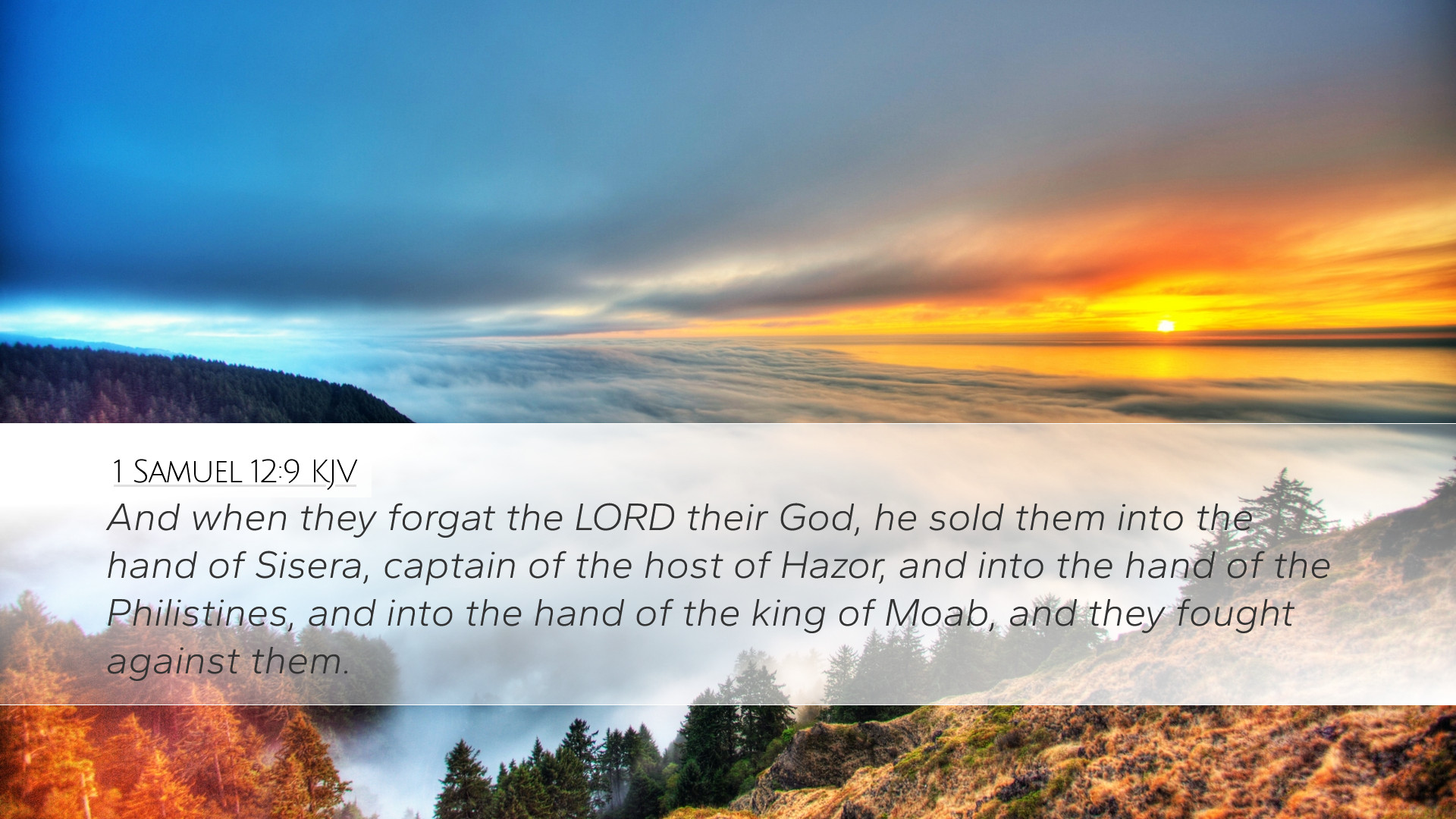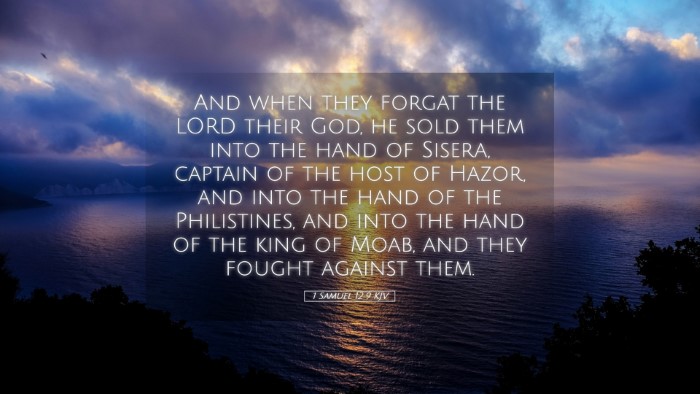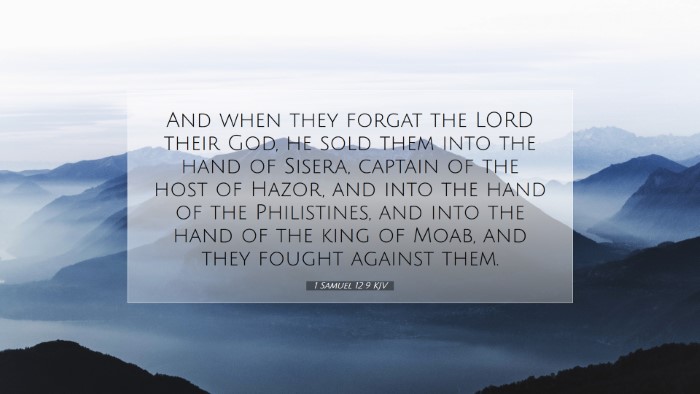Commentary on 1 Samuel 12:9
Verse (1 Samuel 12:9): "But when they forgot the LORD their God, he sold them into the hand of Sisera, and into the hand of the Philistines, and into the hand of the king of Moab; and they fought against them."
Introduction
In 1 Samuel 12:9, Samuel highlights a critical moment in Israel’s history, illustrating the consequences of forgetting God. This verse serves as a reminder of the cyclical nature of Israel's faithfulness and rebellion, as well as God's patience and judgment. The commentaries by Matthew Henry, Albert Barnes, and Adam Clarke provide valuable insights into the meaning and implications of this verse, emphasizing themes of divine sovereignty, human responsibility, and the historical context of Israel's relationship with God.
Contextual Background
Samuel's address in Chapter 12 occurs after Israel has demanded a king, resulting in Saul's anointing. This moment is pivotal as it marks Israel's transition from a theocracy to a monarchy. The historical backdrop reveals that Israel had a pattern of turning away from God despite His continual deliverance and guidance. The mention of Sisera, the Philistines, and Moab serves as a reminder of the nations that oppressed them during their failures.
God's Sovereignty
Matthew Henry explains that the historical examples mentioned by Samuel illustrate God’s sovereignty in allowing Israel to face the natural consequences of their actions. By forgetting the LORD, the Israelites brought upon themselves the very oppressors they initially feared. Their trials served as disciplinary measures, urging them to return to God, demonstrating that while God is merciful, He is also just.
Albert Barnes further elaborates on this theme of divine judgment. He notes that God’s giving Israel into the hands of their enemies was not merely an act of punishment but a means of awakening the nation from their spiritual lethargy. This reflects the broader biblical principle that God allows adversity to prompt repentance and recognition of His lordship.
Human Responsibility and Forgetfulness
Both Henry and Clarke emphasize the role of forgetfulness in spiritual decline. Samuel attributes Israel's suffering to their failure to remember God's past interventions and deliverances, which illustrates a broader theological concept of covenantal fidelity. When the people stray from remembering the LORD — His attributes, deeds, and promises — they are susceptible to sin and idolatry.
Adam Clarke notes that the forgetfulness indicated in this verse is not merely a lapse of memory but a deliberate turning away from God’s commandments. This thematic insight sheds light on the spiritual dynamics that lead to national calamity, showing that forgetfulness is an act of the will, driven by self-reliance and pride. Clarke urges the faithful to actively engage in remembrance and worship to safeguard against such spiritual decay.
Historical Examples of Judgment
The three oppressors mentioned (Sisera, Philistines, and Moab) serve as historical lessons. Matthew Henry points out that each adversary represents a specific instance of Israel's rebellion leading to divine reprisal. Sisera's defeat at the hands of Deborah, the subjugation by the Philistines, and the oppression from Moab all testify to God's deliverance following Israel's cries for help, signaling that every cycle of oppression was a result of their own making.
-
Sisera: Stemming from the Book of Judges, Sisera symbolized Israel’s oppression due to their disobedience, illustrating the immediate consequences of turning from God during the period of the Judges.
-
Philistines: The Philistines posed a continuous threat during Samuel's lifetime and illustrate the external pressures resulting from Israel's internal weaknesses and forgetfulness of God.
-
Moab: Their oppression highlights Israel's unfaithfulness during times of prosperity, demonstrating that even when things appear stable, forgetting God can lead to dire consequences.
Theological Implications
The theological ramifications of 1 Samuel 12:9 extend beyond Israel's history into the contemporary experience of God’s people. As Barnes suggests, the passage serves as a cautionary tale for believers today to maintain their relationship with the Lord. The assertion, "when they forgot" implies that abandonment of God is a choice that leads believers away from peace and fulfillment.
Clarke reflects on the necessity of remembrance through communal practices such as testimonies, feasts, and prayer. These practices are essential for fostering a culture of gratitude and accountability, ensuring that the narrative of God’s faithfulness remains alive in the hearts of believers. Clarke emphasizes that remembrance leads to repentance, a journey towards restorative relationships both with God and within communities.
Conclusion
In conclusion, 1 Samuel 12:9 serves as a poignant reminder of the enduring need for God's people to remember their covenant relationship with Him. As Samuel reflects on Israel’s history of deliverance and decline, his message resonates with contemporary believers who face similar temptations to forget God amidst societal pressures and personal struggles. The insights from public domain commentaries emphasize the necessity of worship, remembrance, and repentance in sustaining a healthy relationship with the Creator. Engaging actively in our faith draws us back to the heart of God, illustrating that His desire is for us to know Him and experience His deliverance in every circumstance.


